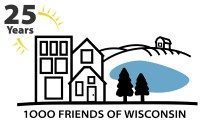FOR IMMEDIATE RELEASE March 19, 2015
Ahead of Budget Hearing, Coalition Calls for Local Road Fixes, Not Wasteful I-94 Expansion
MILWAUKEE — A new study by 1000 Friends of Wisconsin and released today in Milwaukee by the Coalition for More Responsible Transportation finds local roads in Southeast Wisconsin in dismal shape. The group’s analysis of data from the Wisconsin Department of Transportation found nearly one in three roads in the region in need of urgent surface repairs, with about 2500 miles of all local roads judged to be in “failed, very poor, or poor” condition according to the Department’s own classification. 34% of all local roads in Milwaukee are in need of immediate repair.
“Wisconsin’s local roads are failing because of our state’s backwards transportation spending priorities,” said Steve Hiniker, 1000 Friends Executive Director. “WISDOT is proposing to spend $850 million to expand just 3.5 miles of I-94 in Milwaukee, when there are over 6000 miles of local roads in Southeast Wisconsin that need immediate repair.”
This study comes ahead of the Joint Finance Committee’s visit to Milwaukee on Friday, March 19. The state legislature’s budget committee will ask the public to weigh in on Wisconsin’s spending priorities, including on transportation. With budget negotiations underway and some leaders considering raising taxes or increasing the debt to pay for transportation, advocates and Milwaukee residents urged legislators to do the right thing for Wisconsin by focusing the state’s limited transportation funds on maintaining existing local infrastructure and on providing mobility options to more Wisconsinites.
“At this point, we shouldn’t even be talking about borrowing more, taxing more, or spending more to fix Wisconsin’s transportation infrastructure crisis,” said Peter Skopec, WISPIRG Director. “First, we need to get our priorities straight. Our communities’ roads, bridges and public transit systems are being short-changed as we continue to spend billions of dollars, from budget to budget, on unnecessary highway expansions — so let’s start by cutting waste there.”
As detailed in a 2014 WISPIRG report, the state is currently slated to spend more than $2.5 billion on four particularly wasteful highway expansion projects — including the proposed expansion of I-94 in Milwaukee — along stretches of road where traffic is declining or hardly increasing. For just over $1 billion of those highway expansion funds, Wisconsin could implement all recommendations of the bi-partisan Transportation Policy and Finance Commission, including an increase to local road repair funding, transit, bicycle and pedestrian infrastructure investments, and the rehabilitation of state-owned roads, for the next 10 years. For sake of comparison, the $850 million price tag for the expansion of 3.5 miles of I-94 in Milwaukee is greater than the entire annual state highway rehabilitation budget of $792.82 million.
“The Joint Finance Committee has an opportunity to do the right thing for Wisconsin,” concluded Hiniker. “We don’t need to increase people’s taxes, or put more debt on the state’s credit card. We can pay for the repairs we need by simply reprioritizing dollars that we already have.”
Without adequate state support for local transportation infrastructure, Wisconsin communities are stuck in a funding bind. Local officials are forced to use property tax dollars to make up the shortfall in local transportation funding as best they can; at the same time, state-imposed property tax levy limits prevent local governments from fully meeting these local needs. State assistance is essential for the maintenance of local transportation infrastructure.
Wisconsin’s lavish spending on new highway capacity seems particularly short-sighted in light of recent changes in transportation behavior. Wisconsinites are driving less and relying more on non-driving modes of transportation such as walking, biking and transit. The average Wisconsinite today drives no more than he or she did in 1998, and overall vehicle miles travelled in 2013 — the most recent year for which data are available from WISDOT — were down approximately 1.5 percent from the peak level of eight years prior.
The full analysis of the state of local roads in Southeast Wisconsin can be found here.
WISPIRG’s “Fork in the Road” report on Wisconsin’s transportation spending trends and misplaced priorities can be found at https://wispirg.org/reports/wip/fork-road.
# # #
The Coalition for More Responsible Transportation is a coalition of non-profit organizations and concerned citizens. CMRT was formed to challenge the overbuilding of highways in Wisconsin, which is leaving our local roads and transit systems to crumble.
CONTACT:
Peter Skopec, WISPIRG
peter@wispirg.org
(847) 687-7229
Steve Hiniker, 1000 Friends of Wisconsin
hiniker@1kfriends.org
(608) 320-5569
